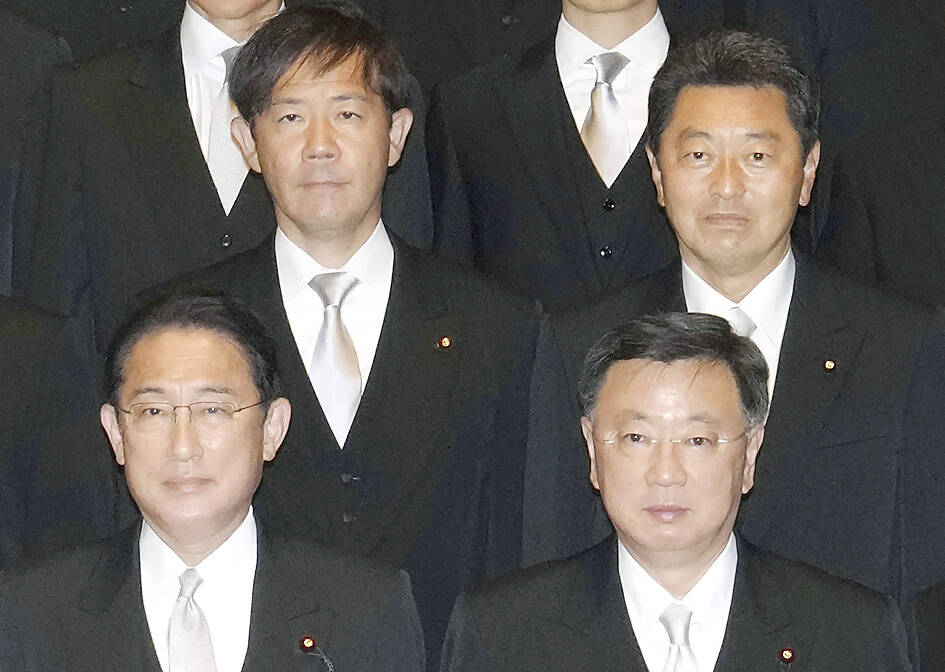Japanese prosecutors made their first arrest yesterday in connection with a major political slush funds scandal that has rocked Japanese Prime Minister Fumio Kishida’s already unpopular government.
Tokyo District Public Prosecutors’ Office apprehended former Japanese vice-education minister Yoshitaka Ikeda on suspicion of failing to report fundraising proceeds he received from his faction within the governing Liberal Democratic Party (LDP), according to Japanese officials and local media reports.
Ikeda’s faction, which used to be led by the former Japanese prime minister Shinzo Abe, who was assassinated in 2022, has remained the largest and most influential faction within Kishida’s party. The faction is suspected of failing to report more than ¥600 million (US$4.15 million).

Photo: Kyodo News via AP
The former minister was accused of not reporting the ¥40 million he received from the faction as a kickback from political event ticket sales, a violation of the political funds control law, media reports said.
Prosecutors declined to give details.
Kishida declined to comment on the investigation, but last month said that he took the investigation seriously and would do his best to regain public trust, including setting up an expert panel to strengthen fundraising regulations.
Last year, dozens of LDP lawmakers, mostly members of the Abe faction, were accused of systematically failing to report about ¥600 million in funds in possible violation of campaign and election laws, media reports said.
The money is alleged to have gone into unmonitored slush funds.
Kishida replaced four of his Cabinet ministers linked to the scandal last month in an attempt to mitigate the scandal that has rocked his party and grip on power. Then-Japanese chief cabinet secretary Hirokazu Matsuno and then-minister of economy, trade and industry Yasutoshi Nishimura were among those removed. Prosecutors reportedly interviewed the two top officials on a voluntary basis, along with several other LDP lawmakers.
Support ratings for Kishida have continued to drop, falling below 20 percent, despite purging members of the Abe wing involved in the scandal. This move could trigger an internal power struggle within the party.
The fundraising scandal is considered one of the biggest blunders in decades by the powerful party.
However, the LDP’s grip on power is seen unchanged as long as the opposition remains fractured, although Kishida’s leadership is shaking.
He does not have to call a parliamentary election until next year, but the LDP is to have a leadership vote in September.

The US government has signed defense cooperation agreements with Japan and the Philippines to boost the deterrence capabilities of countries in the first island chain, a report by the National Security Bureau (NSB) showed. The main countries on the first island chain include the two nations and Taiwan. The bureau is to present the report at a meeting of the legislature’s Foreign Affairs and National Defense Committee tomorrow. The US military has deployed Typhon missile systems to Japan’s Yamaguchi Prefecture and Zambales province in the Philippines during their joint military exercises. It has also installed NMESIS anti-ship systems in Japan’s Okinawa

‘WIN-WIN’: The Philippines, and central and eastern European countries are important potential drone cooperation partners, Minister of Foreign Affairs Lin Chia-lung said Minister of Foreign Affairs Lin Chia-lung (林佳龍) in an interview published yesterday confirmed that there are joint ventures between Taiwan and Poland in the drone industry. Lin made the remark in an exclusive interview with the Chinese-language Liberty Times (the Taipei Times’ sister paper). The government-backed Taiwan Excellence Drone International Business Opportunities Alliance and the Polish Chamber of Unmanned Systems on Wednesday last week signed a memorandum of understanding in Poland to develop a “non-China” supply chain for drones and work together on key technologies. Asked if Taiwan prioritized Poland among central and eastern European countries in drone collaboration, Lin

Renewed border fighting between Thailand and Cambodia showed no signs of abating yesterday, leaving hundreds of thousands of displaced people in both countries living in strained conditions as more flooded into temporary shelters. Reporters on the Thai side of the border heard sounds of outgoing, indirect fire yesterday. About 400,000 people have been evacuated from affected areas in Thailand and about 700 schools closed while fighting was ongoing in four border provinces, said Thai Rear Admiral Surasant Kongsiri, a spokesman for the military. Cambodia evacuated more than 127,000 villagers and closed hundreds of schools, the Thai Ministry of Defense said. Thailand’s military announced that

CABINET APPROVAL: People seeking assisted reproduction must be assessed to determine whether they would be adequate parents, the planned changes say Proposed amendments to the Assisted Reproduction Act (人工生殖法) advanced yesterday by the Executive Yuan would grant married lesbian couples and single women access to legal assisted reproductive services. The proposed revisions are “based on the fundamental principle of respecting women’s reproductive autonomy,” Cabinet spokesperson Michelle Lee (李慧芝) quoted Vice Premier Cheng Li-chiun (鄭麗君), who presided over a Cabinet meeting earlier yesterday, as saying at the briefing. The draft amendment would be submitted to the legislature for review. The Ministry of Health and Welfare, which proposed the amendments, said that experts on children’s rights, gender equality, law and medicine attended cross-disciplinary meetings, adding that